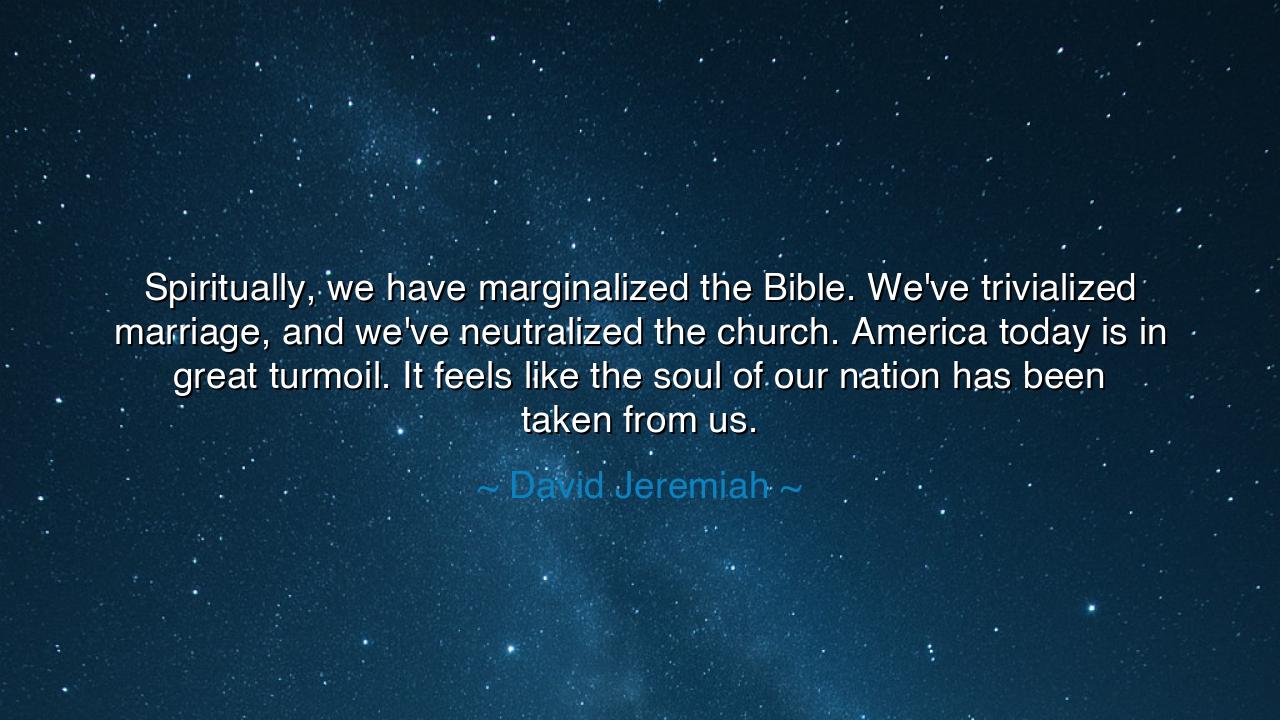
Spiritually, we have marginalized the Bible. We've trivialized
Spiritually, we have marginalized the Bible. We've trivialized marriage, and we've neutralized the church. America today is in great turmoil. It feels like the soul of our nation has been taken from us.






In an age when the echoes of faith grow faint and the foundations of virtue tremble, David Jeremiah raised his voice as one crying in the wilderness: “Spiritually, we have marginalized the Bible. We've trivialized marriage, and we've neutralized the church. America today is in great turmoil. It feels like the soul of our nation has been taken from us.” His words are not the murmurings of despair, but the lament of a prophet who sees the moral pillars of civilization cracking beneath the weight of apathy. This quote, like the tolling of a great bell, awakens the heart to reflection. It reminds us that when a people forget their spiritual compass, they drift into chaos—not by sudden collapse, but by slow erosion.
To marginalize the Bible is to silence the voice that once called men and women to righteousness, mercy, and wisdom. The ancients knew that a people’s sacred text—be it scroll, song, or scripture—is the anchor of its soul. When that anchor is lifted, the ship of society begins to drift upon uncertain seas. David Jeremiah speaks to an America where the Word has become decoration, not direction; where moral guidance has been replaced by convenience. And so the lamp that once lit the path of generations flickers, its oil running low.
Next, he mourns that we have trivialized marriage, that holy covenant meant not merely for love but for the strengthening of families, communities, and nations. In ancient days, marriage was seen as the binding of souls, a reflection of divine harmony. When the vow was broken or mocked, kingdoms fell—not from invasion, but from within. Consider the tale of King Solomon, who began his reign with wisdom and devotion but ended it divided in heart, his many alliances and indulgences corroding the sanctity of his household. Thus, even the wisest of men fell, not by sword or famine, but by the weakening of the sacred bond that mirrors the bond between God and His people.
To neutralize the church—ah, this is perhaps the gravest wound. The church, once a lion roaring truth to kings and commoners alike, has in many places become a whisper, tamed by comfort and compromise. It was meant to be the conscience of the nation, but now it is too often content to echo the world instead of challenging it. Where once the prophets thundered, “Thus saith the Lord,” now we hear, “Let us not offend.” David Jeremiah’s lament is that the church has lost its fire, its holy defiance, its power to heal and to correct. A neutralized church cannot stand against the storms of moral decay; it drifts with them.
And so he declares, “America today is in great turmoil.” These are not words of politics, but of spirit. The turmoil he speaks of is not merely seen in cities or governments, but in hearts—divided, restless, and weary. The people cry for peace, yet neglect the Source of peace; they chase freedom, yet shun the discipline that sustains it. Like Israel in the wilderness, they long for deliverance while doubting the God who leads them. Thus, Jeremiah’s cry is both a diagnosis and a call—to repentance, to remembrance, to renewal.
To say “the soul of our nation has been taken from us” is not to suggest theft, but surrender. A soul cannot be stolen—it must be given away, piece by piece, through neglect and compromise. When truth is mocked, when sacred things are made common, when comfort replaces conviction, the soul slips quietly from the body of a people. Yet hope remains, for what is lost may yet be found if the people awaken and return to the Source of life.
Let us remember the story of Nehemiah, who found Jerusalem in ruins—its walls broken, its people scattered, its worship forgotten. Yet through faith, prayer, and courage, he rebuilt what was lost. He did not wait for the kings of the earth to act; he began with the stones before him. Likewise, every man and woman today must pick up the stones of faith and rebuild the walls of the spirit—within their homes, their marriages, their churches, and their hearts.
And so, beloved listener, the lesson is this: when a nation loses its soul, it is not through battle or famine, but through forgetfulness. To restore it, one must begin at the altar, not the throne. Read the sacred word not as a relic, but as breath. Guard your marriage not as a contract, but as a covenant. Stand in your faith not timidly, but boldly, for truth has never survived in silence. Let every heart become a sanctuary once more, and every home a lamp against the darkness. Then shall the soul of a nation return—not by decree, but by devotion.
Thus spoke the wise: a people may lose their wealth, their armies, and their power, yet if they keep their faith, they shall rise again. But if they lose their spirit, even their victories will taste of dust. Guard, therefore, the sacred within you—for the soul of a nation begins in the soul of one righteous heart.






AAdministratorAdministrator
Welcome, honored guests. Please leave a comment, we will respond soon